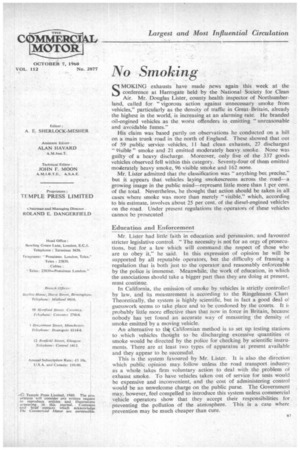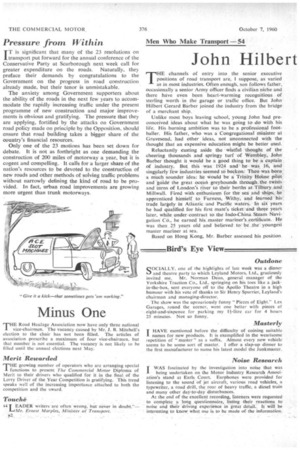No Smoking
Page 35

Page 36

If you've noticed an error in this article please click here to report it so we can fix it.
MOKING exhausts have made news again 'thiS week at the conference at Harrogate held by the NationalSociety for Clean Air. Mr. Douglas Lister, county health inspector of Northumberland, called for "vigorous action against unnecessary smoke from vehicles," particularly as the density of traffic. in Great,Britain, already the highest in the world, is increasing at an alarming rate. He branded oil-engined vehicles as the worst offenders in emitting "unreasonable and avoidable fumes."
His claim was based partly on observations he conducted on a hill on a main trunk road in the north of England. These showed that out of 59 ,public service vehicles, 11 had clean exhausts, 27 discharged " 'visible" smoke and 21 emitted moderately heavy. smoke, None was guilty of a heavy discharge. Moreover, only five of the 337 goods vehicles observed fell within this category. Seventy-four of them emitted motierately heavy smoke, 96 visible smoke and 162 none.
Mr_ Lister admitted that the classification was "anything but precise." but it appears that vehicles laying smokescreens across the road—a growing image in the public mind—represent little more than 1 per cent. of the total. Nevertheless, he thought that action should be taken in all cases where smoke was more than merely "visible." which, according to his estimate, involves about 25 per cent. of the diesel-engined vehicles on the road. Under present regulations the operators of these vehicles cannot be prosecuted Education and Enforcement Mr. Lister had little faith in education and persuasion, and favoured stricter legislative control. " The necessity is not for an orgy of prosecu. tions, but for a taw which will command the respect of those who are to obey it," he said. In this expression of opinion he will be supported by all reputable operators, but the difficulty of framing a regulation that is both just to the operator and reasonably enforceable by the police is immense. Meanwhile, the work of education, in which the associations should take a bigger part than they are doing at present, must continue.
In California, the emission of smoke by vehicles is strictly controlled by law, and its measurement is according to the Ringelmann Chart Theoretically, the system is highly scientific, but in fact a good deal 01 guesswork seems to take place and to be condoned by the courts. It it probably little more effective than that now in force in 'Britain, because nobody has yet found an accurate way of measuring the density of smoke emitted by a moving vehicle. An alternative to thiv Californian method is to set up testing stations to which , vehicles thought to be discharging excessive quantities of smoke would be directed by the police for checking by scientific instruments, There are at least two types of apparatus at present available and they appear to be successful. This is the system favoured by Mr. Lister. It is also the direction which public opinion may follow unless the road transport industry as a whole takes firm voluntary action to deal with the problem of exhaust smoke. To have vehicles taken out of service for tests would be expensive and inconvenient, and the cost of administering control would be an unwelcome charge on the public purse. The Government may, however, feel compelled to introduce this system unless commercial vehicle operators show that they accept their responsibilities for preventing the pollution of the atmosphere. This is a case where prevention may be much cheaper than cure.
Pressure from Within
IT is significant that many of the 23 resolutions on transport put forward for the annual conference of the Conservative Party at Scarborough next week call for greater expenditure on the roads. Naturally, they preface their demands by congratulations to the Government on the progress in road construction already made, but their tenor is unmistakable.
The anxiety among Government supporters about the ability of the roads in the next few years to accommodate the rapidly increasing traffic under the present programme of new construction and major improvements is obvious and gratifying. The pressure that they are applying, fortified by the attacks on Government road policy made on principle by the Opposition, should ensure that road building takes a bigger share of the country's finanCial resources.
Only one of the 23 motions has been set down for debate. It is not as forthright as one demanding the construction of 200 miles of motorway a year, but it is cogent and compelling. It calls for a larger share of the nation's resources to be devoted to the construction of new roads and other methods of solving traffic problems without narrowly defining the kind of road to be provided. In fact, urban road improvements are growing more urgent than trunk motorways.
































































































































